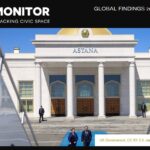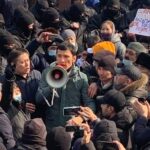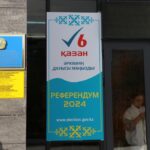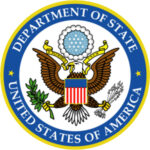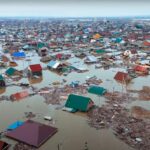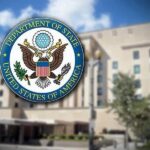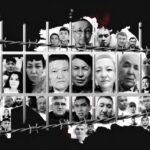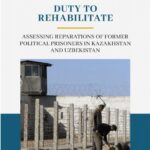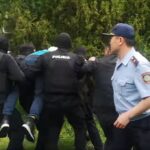8 September 2009 Public
amnesty international
Submission to the UN Universal Periodic Review
Seventh session of the UPR Working Group of the Human Rights Council
February 2010
Executive summary
In this submission, Amnesty International provides information under sections B, C and D as stipulated in the General Guidelines for the Preparation of Information under the Universal Periodic Review:[1]
· In section B, we describe legal developments relating to judicial review of the decision to detain a person.
· In section C, we describe concerns related to persistent allegations of torture or other ill-treatment of detainees by law enforcement forces, including officers from the National Security Service (NSS), and failure to consistently, effectively and systematically investigate such allegations; and human rights violations in the context of national security and the fight against terrorism, especially in relation to refugees and asylum-seekers, and religious minorities.
· In section D, Amnesty International makes a number of recommendations for action by the government in the areas of concern listed.
Kazakhstan
Amnesty International submission to the UN Universal Periodic Review
Seventh session of the UPR Working Group, February 2010
B. Normative and institutional framework of the State
Legal developments
A law introducing judicial review of the decision to detain a person entered into force in August 2008. Although this was a positive development, it still does not allow the detainee or their representative to challenge the lawfulness of their detention as required by international standards. The authority to sanction arrest, in this instance, does not refer to the authority to issue arrest warrants. It refers to the authority to rule on whether or not the decision by the competent law enforcement officials to detain a suspect in a pre-charge facility (IVS – “isolator vremmenogo soderzhania” ) and the application to the court by the prosecutor’s office to keep the suspect in pre-trial detention are appropriate and in conformity with the law. The law does not require that the detained person be brought promptly before the court following detention. In effect, the detained person is not required to be brought before the court until 68 hours after they have been formally detained. This is of particular concern, as Amnesty International’s research indicates that torture or other ill-treatment often occurs during apprehension, detention, transfer to an IVS, and initial interrogation, often in the absence of a defence lawyer. Neither this law nor the Criminal Procedural Code precludes the judge conducting the initial review of detention from presiding over the trial of the same individual.
Amnesty International is also concerned that judges do not exercise their authority to independently and impartially decide on the legality of the arrest and detention and the need for continued detention. This concern is shared by the UN Special Rapporteur on torture, who visited Kazakhstan in May 2009 at the invitation of the authorities. In a statement issued at the end of his nine-day visit, the Special Rapporteur said: “judges are seen as being formally present at certain points of the criminal process to rubberstamp prosecutorial decisions rather than interested in finding out the truth and meaningfully following up on torture allegation”.[2]
De facto incommunicado detention
According to information received by Amnesty International, most instances of torture or other ill-treatment occur before the “formal detention” of a suspect, i.e. before the detained person is registered at the police station. According to the law, a person must be registered at a police station no later than three hours after he or she has been apprehended; the registration constitutes formal detention.[3] The register must list the exact time and place of apprehension and the reason for the detention. However, the law does not define the actual moment of detention as the time at which a person is stopped, taken into custody and brought to a police station for questioning.
The law only extends the rights to a lawyer, to contact relatives and to be informed of one’s rights and any charges, to persons who have been formally detained, i.e. once an individual detained in connection with a criminal case has been brought into and registered at the police station. The law does not require these rights — which are key safeguards against torture and other ill-treatment — to be granted to individuals brought in for questioning in a criminal case, or to asylum-seekers or foreign nationals taken to a police station to check their documents.
According to information received by Amnesty International, law enforcement officials often do not abide by the existing law on detention, as they fail to register detainees within the required three hours after an individual has been deprived of their liberty. Amnesty International is concerned that in such cases, people are deprived of their liberty in de facto arbitrary and incommunicado detention, at the discretion of the detaining law enforcement officials; during this time, they are without adequate protection against torture or other ill-treatment and are outside of the protection of the law. Amnesty International is particularly disturbed by the number of juveniles held in such de facto incommunicado detention, who alleged that they were tortured or otherwise ill-treated in order to force them to confess to crimes. During his fact-finding visit, the Special Rapporteur on torture found that “many of these safeguards are not effective in practice: since the moment of apprehension and delivery to a police station is not recorded, it is impossible to establish whether the three-hour maximum delay for the first stage of deprivation of liberty is respected; in fact we received many allegations that the first hours of (unrecorded) detention are used by law-enforcement organs for the extraction of confessions by means of torture”.[4]
C. Promotion and protection of human rights on the ground
Torture or other ill-treatment
Despite the authorities’ declarations and apparent efforts to reduce the use of cruel, inhuman or degrading methods of apprehension and detention, torture and other ill-treatment remain widespread and such acts are committed with virtual impunity. Beatings by law enforcement officers appear to continue to be routine, especially in IVS facilities during initial interrogation, in the street during apprehension, or during transfer to detention centres. Few law enforcement officers have been brought to trial and held accountable for violations, including torture, despite scores of people alleging that they have been tortured in custody in order to extract a confession. Evidence based on confessions extracted under torture is still routinely admitted in court. Corruption in law enforcement and the judiciary is believed to contribute significantly to the climate of impunity.
In November 2008, after examining Kazakhstan’s second periodic report, the Committee against Torture called on the authorities “to apply a zero-tolerance approach to the persistent problem of torture”.[5] The Committee also urged the authorities to “promptly implement effective measures to ensure that a person is not subject in practice to unacknowledged detention and that all detained suspects are afforded, in practice, all fundamental legal safeguards during their detention”. Following his visit in May 2009, the Special Rapporteur on torture outlined his initial findings: “I conclude that the use of torture and ill-treatment certainly goes beyond isolated instances.” He also said that he had “received many ‘credible allegations’ of beatings with hands and fists, plastic bottles filled with sand and police truncheons,” and that he “was also told of kicking, asphyxiation through plastic bags and gas masks used to obtain confessions from suspects”. In several cases, these allegations were supported by forensic medical evidence.[6]
Lack of effective and independent investigations
In May 2009, the UN Special Rapporteur on torture expressed concern at the “almost total absence” of official complaints [of ill-treatment], which raises doubt about whether there is in fact a meaningful complaint mechanism, stating, “It appears that most detainees refrain from filing complaints because they do not trust the system or are afraid of reprisals”.[7] National legislation in Kazakhstan does not specifically call for a prompt and impartial investigation into a complaint of torture or other ill-treatment. Instead it requires the competent authorities to register a complaint and to open a criminal case into the complaint if sufficient evidence is presented that a criminal offence has been committed, and to inform the complainant of the decision.[8] However, the law gives the competent authorities from 72 hours to up to two months to decide whether or not to open a criminal case into allegations of torture or ill-treatment. There is also no independent mechanism or structure to investigate complaints of torture promptly, thoroughly and impartially. Most complaints of torture by law enforcement officers, brought to Amnesty International’s attention, are passed by the prosecutor’s office to the Directorate of Internal Security of the respective Department of Internal Affairs for further investigation. In practice, this means that one section of law enforcement investigates members of another section of law enforcement. In the majority of cases, the investigation is not impartial or thorough and the complainants are often not interviewed in person. Law enforcement officers accused of torture or other ill-treatment generally refute the allegations, stating that the complainant resisted arrest, that they acted in self-defence or that the injuries had been sustained prior to detention. In many cases no criminal case is opened or the case is closed for lack of sufficient corroborating evidence.
Human rights violations in the context of national security and the fight against terrorism
The fight against terrorism and other threats to national security are frequently invoked by the authorities as crucial to securing national and regional stability. However, all too frequently, pursuance of these aims is invoked when targeting vulnerable groups or groups perceived as a threat to national or regional security, and in pursuance of these aims the authorities violate human rights, including by resorting to torture or other ill-treatment. Among those particularly targeted are banned Islamic groups and Islamist parties, or other religious minorities, and asylum-seekers from neighbouring countries, in particular from China and Uzbekistan. The Special Rapporteur on torture stated in May 2009 that “there are some groups that run larger risks of cruel, inhuman and degrading treatment than others”, noting that the likeliness for foreigners to be subjected to such treatment seems to be “higher than average”. Although presumption of innocence is enshrined in law, it is violated on a regular basis, particularly in the context of so-called national security cases, including high-profile criminal cases linked to the prosecution of state officials and leading political actors, and in the fight against terrorism, with suspects often branded guilty in public before the start of the trials. Terrorism with loss of life is the only Article in the Criminal Code, which can be punished by death in peacetime.
Amnesty International is concerned about allegations of routine torture and other ill-treatment in IVSs and pre-trial detention centres under the jurisdiction of the NSS, especially in the context of national and regional security and anti-terrorism operations conducted by the NSS.[9] The NSS is directly accountable only to the President. Public Monitoring Commissions have no access to NSS detention facilities. Amnesty International continues to receive allegations that members or suspected members of banned Islamist parties, such as Hizb-ut-Tahrir,[10] targeted in counter-terrorism operations, are subject to arbitrary and prolonged incommunicado detention. In several cases relatives have complained that the men had been tortured or otherwise ill-treated in order to confess to crimes they had not committed. Trials in such cases are closed to the public for reasons of national security and independent observers are therefore not able to access the courtroom and monitor the trials. In a number of such cases, Amnesty International was informed that the courts had not initiated investigations into the allegations of torture or other ill-treatment by the accused and “confessions” extracted under torture were admitted as evidence by the trial judges.
Refugees and asylum-seekers
The authorities continue to co-operate with Uzbekistan, the Russian Federation and China, in the name of regional security and counter-terrorism, in ways that breach their obligations under international human rights and refugee law. Refugees are not effectively protected and continue to be at risk of refoulement or abductions.
The situation of refugees and asylum-seekers from the Commonwealth of Independent States (CIS) – in particular religious asylum-seekers from Uzbekistan – and from the Xingjian Autonomous Republic of China (XUAR) remain difficult. There is no national status determination process in place and no system of protection of refugees and asylum-seekers. There is also no procedure in national law to challenge an order of deportation on the grounds of risk of serious human rights violations faced by a person upon return. The government has not acknowledged the right of asylum-seekers from the CIS and XUAR to seek international protection in Kazakhstan. The office of the UN High Commissioner for Refugees (UNHCR) in Kazakhstan has been tasked with assessing this category of asylum-seekers and determining their status. Those afforded UN mandate refugee status have been put forward for resettlement to a third country. Those not given mandate refugee status have found themselves with no access to protection and at risk of being forcibly returned to Uzbekistan or China, or abducted by members of the Uzbekistani or Chinese security services. Officers of the Uzbekistani and Chinese security services are believed to be operating relatively freely on Kazakhstan territory. Kazakhstan migration police continue to cooperate with their Uzbekistani counterparts and to transmit information on asylum-seekers and refugees to them, including addresses and contact numbers, fingerprints, and photographs. Uzbekistani authorities can then exert pressure on their relatives in Uzbekistan to get those seeking protection to return voluntarily; in some cases they have even paid for relatives to travel to Kazakhstan to trace the refugees and to convince them to return. Even though fewer extraditions have been reported over the past three years, asylum-seekers from China and Uzbekistan remain extremely vulnerable to arbitrary detention, threats of forcible return and intimidation.
Freedom of religion
In January 2008, President Nazarbaev attacked religious minorities by stating that they were a “threat to national security and values”. He alleged that thousands of missionaries and extremists were threatening the fabric of society. Law enforcement officials, especially the NSS, have stepped up their harassment of non-traditional groups, such as the Hare Krishna community, Jehovah’s Witnesses, and Evangelist and Protestant churches. In November 2008, Parliament rushed through a controversial draft law on freedom of conscience, which would, among other restrictions, ban all unregistered religious activity and require all religious communities to re-register. In January 2009, the President sent the draft law to the Constitutional Council for review in relation to Kazakhstan’s obligations under international human rights law and to check whether it was constitutional. The Constitutional Council found that the draft law was in contravention of the Constitution and breached international standards of freedom of religion. A decision as to whether to review the draft law was pending at the time of writing.
D. Achievements, best practice, challenges and constraints
Among the positive developments welcomed by Amnesty International are the ratification of the Optional Protocol to the Convention against Torture (OPCAT) and the signing of the Optional Protocol to the International Covenant on Civil and Political Rights in 2008. As required under OPCAT, Kazakhstan has cooperated and consulted with civil society and international organizations to establish a National Preventive Mechanism to assume independent and announced monitoring of all places of deprivation of liberty within 12 months of acceding to OPCAT.
Other positive measures include the creation in 2005 of Public Monitoring Commissions which are granted access to most – but not all – prison and detention facilities throughout the country; the transfer of the majority of prison and detention facilities from the jurisdiction of the Ministry of Internal Affairs to the Ministry of Justice, and the creation of the office of an Ombudsman. In 2008, the Ministry of Internal Affairs granted access to its temporary pre-charge detention facilities in Almaty region to NGO monitors and allowed them to conduct unannounced and unsupervised inspections. Officials of the Ministry of Internal Affairs told Amnesty International in June 2009 that a draft law proposing to extend such independent monitoring to similar facilities throughout several regions of Kazakhstan is awaiting approval by Parliament.
Moves to reduce the scope of the death penalty in Kazakhstan have also been welcome developments. In May 2007, the scope of the application of the death penalty permitted by the Constitution was reduced from 10 “exceptionally grave” crimes to one – that of terrorism leading to loss of life. The death penalty also remains as a possible punishment for “exceptionally grave” crimes committed during times of war. A person sentenced to death in Kazakhstan retains the right to petition for clemency. The moratorium on executions, imposed in 2003, remains in force and no death sentences have been passed since 2007. All 31 prisoners on death row have had their sentences commuted to life imprisonment.
Recommendations for action by the State under review
Amnesty International calls on the government:
Ratification of human rights standards and cooperation with the UN
· To ratify all outstanding human rights treaties, in particular the Second Optional Protocol to the International Covenant on Civil and Political Rights aiming at the abolition of the death penalty;
· To ratify the Rome Statute of the International Criminal Court and enact implementing legislation.
Torture or other ill-treatment
· To condemn the use of torture and other ill-treatment and to ensure prompt, impartial and comprehensive investigations of all complaints of torture or cruel, inhuman or degrading treatment or punishment of any person subjected to any form or arrest, detention or imprisonment, as well as when there are reasonable grounds to believe that torture or ill-treatment has occurred even if no complaint was made;
· To consider establishing a fully resourced independent agency to investigate all allegations of human rights violations committed by officers of all law enforcement agencies or by persons acting on orders of such agencies or with the knowledge or complicity of such agencies;
· To ensure that this agency is mandated to carry out detailed reviews of past investigations conducted by law enforcement officers into allegations of torture or other ill-treatment and of judicial proceedings in such cases, and that it be given effective access to remand and court hearings, investigations and other relevant processes;
· To ensure that no statements obtained as a result of torture or other ill-treatment are used as evidence in trial proceedings, except as evidence against a person accused of torture or other ill-treatment;
· To ensure that the law is amended so that individuals deprived of their liberty are registered promptly, from the moment of apprehension, and not only after a three-hour time limit;
· To ensure that all people deprived of their liberty are informed promptly of the reasons for their detention, of any charges against them, and allowed prompt and regular access to a lawyer of their choice, as well as to their relatives and an independent medical practitioner.
Human rights violations in the context of national security and the fight against terrorism
· To ensure that all trials, including of terrorism suspects, scrupulously observe international standards for fair trial;
· To ensure the whereabouts of all individuals, including suspects accused of involvement in terrorist acts, detained by NSS officers are promptly disclosed and that they are allowed prompt and regular access to a lawyer of their choice, as well as to their relatives and an independent medical practitioner;
· To grant Public Monitoring Commissions immediate access to those detained in NSS facilities.
Refugees and asylum-seekers
· To respect its obligations under customary international law and the principle of non-refoulement, as well as under the 1951 Refugee Convention, the International Covenant on Civil and Political Rights, and Article 3 of the Convention against Torture, which prohibit the return of a person to a country or territory where they may face serious human rights violations, and to ensure that no one is expelled, returned or extradited to another country, in particular Uzbekistan and China, where they would be at risk of torture or other ill-treatment; or of facing execution following an unfair trial in China;
· To fully respect the right to seek asylum and ensure that all those seeking international protection in Kazakhstan, including in particular refugees and asylum-seekers from China and Uzbekistan, are provided protection in accordance with the Refugee Convention and UNHCR’s mandate, including access to durable solutions;
· To ensure that all persons seeking international protection get access to fair and transparent asylum procedures, with the right of appeal.
Freedom of religion
· To ensure respect for the human rights of religious believers and that they are able to carry out their peaceful activities free from harassment and without threat of detention, imprisonment and other human rights violations.
Appendix: Amnesty International documents for further reference[11]
· Kazakhstan: Summary of Concerns on Torture and Ill-treatment, Briefing for the United Nations Committee against Torture, November 2008, AI Index: EUR 57/001/2008
· Human Rights Concerns in Central Asia, May 2009, Amnesty International EU Office
[1] Contained in Human Rights Council Decision 6/102, Follow-up to Human Rights Council resolution 5/1, section I adopted 27 September 2007.
[3] Article 134 of the Criminal Procedural Code of Kazakhstan on the procedure for detaining a person suspected of having committed a crime
[5] Consideration of Reports submitted by States Parties Under Article 19 of the Convention, Concluding Observations of the Committee against Torture, Kazakhstan, CAT/C/KAZ/CO2, 12 December 2008.
[7] ibid.
[8] Articles 186 & 177 of the Criminal Procedural Code.
[9] Counter-terrorism operations, internal security as well as investigations into unregistered or banned groups, organizations or parties, such as banned or unregistered religious organizations or groups, fall into the remit of the NSS.
[10] Hizb-ut-Tahrir (the party of liberation) a transnational Islamic movement with origins in the Middle East, which aspires to establishing a caliphate, does not advocate the use of violence. Hizb-ut-Tahrir is banned in Kazakhstan.
[11] All of these documents are available on Amnesty International’s website: http://www.amnesty.org/en/region/kazakstan


